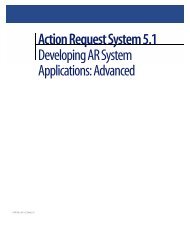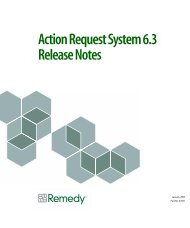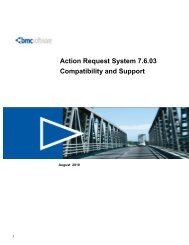BMC Remedy Action Request System 7.6.04: BMC Remedy Mid Tier ...
BMC Remedy Action Request System 7.6.04: BMC Remedy Mid Tier ...
BMC Remedy Action Request System 7.6.04: BMC Remedy Mid Tier ...
You also want an ePaper? Increase the reach of your titles
YUMPU automatically turns print PDFs into web optimized ePapers that Google loves.
<strong>BMC</strong> <strong>Remedy</strong> <strong>Action</strong> <strong>Request</strong> <strong>System</strong> <strong>7.6.04</strong><br />
142 <strong>BMC</strong> <strong>Remedy</strong> <strong>Mid</strong> <strong>Tier</strong> Guide<br />
NOTE<br />
You can override a field’s search style by using a leading percent sign. For<br />
example, if the field’s search style is Equal and you enter %Rob into the Submitter<br />
field, your search finds Robert Smith and Jim Robertson (not only equal matches<br />
to %Rob). However, if you use a leading percent sign, you lose any faster search<br />
times that would result from using the Equal or Leading search styles. See “Search<br />
styles in character fields” on page 139.<br />
Using wildcard symbols as explicit characters in a form<br />
To search for the actual characters that serve as wildcard symbols, you must force<br />
the system to interpret these wildcard characters as explicit characters. For<br />
example, you might need to search for all instances of the percent sign instead of<br />
using the percent sign as a wildcard symbol.<br />
To search for the percent sign (%), underscore (_), or open bracket ([) as an explicit<br />
character, enclose the character in square brackets. For example, if you enter the<br />
percent sign in square brackets ([%]), the system searches for instances of the<br />
percent sign instead of using it as a wildcard character.<br />
The close bracket (]) functions as a wildcard only when it is accompanied by an<br />
open bracket ([). The hyphen (-) functions as a wildcard character only when<br />
preceded by an open bracket ([) or an open bracket with a caret ([^).<br />
Using the advanced search bar<br />
You can use the advanced search bar to define a more complex set of criteria than<br />
you can specify by using only fields in a form. For example, you can search for all<br />
requests with two different values in the same field. Thus, you could search for all<br />
requests that have a status of Fixed or Closed.<br />
To show or hide the advanced search bar, click the Advanced Search button in a<br />
search window. When visible, it appears at the bottom of the browser window.<br />
When you specify search criteria in the advanced search bar, you can use the same<br />
operators as in the form, and several more. See “Using relational operators in the<br />
advanced search bar” on page 147.<br />
For more information, see “Examples of advanced search bar statements” on<br />
page 150.<br />
NOTE<br />
If you enter search criteria in the advanced search bar and then hide the advanced<br />
search bar, the criteria is still used to find matching requests. If you have entered<br />
criteria in the advanced search bar and then decide not to use it, you must clear the<br />
advanced search bar before you hide it.





